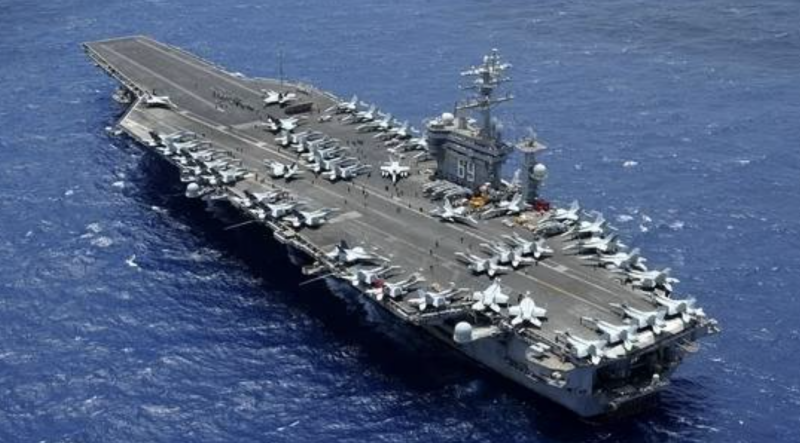
Destroyer USS Dwight D. Eisenhower arrived in the Red Sea on Oct. 24. (Credit: AFP)
On Monday, the US announced the creation of an international maritime coalition in response to the growing number of Houthi attacks in the Red Sea. Led by Washington, this task force brings together ten countries, including NATO members Canada, France, Great Britain, Italy, Spain, the Netherlands and Norway, as well as the Seychelles and Bahrain. The small kingdom, home to the US Fifth Fleet, is the only country in the region to have joined the coalition.
Having normalized relations with Tehran in March, Riyadh fears it could jeopardize the delicate peace talks with the Houthis, which it hopes to reach an agreement with before the end of the year, according to pro-Hezbollah newspaper Al Akhbar. Abu Dhabi, which supports the separatists of Yemen's Southern Transitional Council, would like to see a military response against Yemeni rebels in the country. Washington is still trying the diplomatic route, having established contact via Omani mediation, calling on Houthis to de-escalate. For the time being, the Houthis responded that their attacks will continue as long as Israel pursues its campaign in the Gaza Strip.
Eleonora Ardemagni, Yemen specialist and researcher at the Italian Institute for International Political Studies (ISPI), took a closer look at the new sinews of war.
L’Orient-Le Jour: Why is Bahrain the only Gulf country involved in the maritime coalition, when Saudi Arabia and the United Arab Emirates also have a vested interest in containing the Houthi threat?
Ardemagni: In addition to being home to the US Fifth Fleet, Bahrain has achieved an excellent level of naval interoperability with the US. In 2021, they jointly conducted a maritime integrated anti-drone exercise, which is specific to current events in the Red Sea. They have also made the information public. Although Saudi Arabia and the UAE have also conducted joint military exercises with the USA, they have not achieved this degree of interoperability in the naval sphere. Their approach to this international maritime coalition is therefore nuanced, but the challenges they face on this new front are also unique to each. Riyadh and Abu Dhabi have both suffered Houthi attacks on their territory, while Manama has not. However, the two petro-monarchies have their own reasons for staying out of this coalition.
What are these reasons? How do Saudi Arabia and the Emirates intend to respond to the growing number of attacks?
Saudi Arabia uses diplomacy, which includes the peace talks initiated with the Houthis earlier this year. It is counting on Omani mediation and is still betting on its detente with Iran to keep the Houthis at the negotiating table, although they remain fairly autonomous. Riyadh does not therefore seem keen to join an American military initiative and, in any case, is waiting to see how it will be received in the region. Its priority is to avoid escalation with the Houthis, but also with Iran. [This is because] the threat is not only to its territory or border with Yemen, but in particular to the Saudi Red Sea coast, which is home to most of the Vision 2030 projects [including the futuristic megalopolis of NEOM and the eco-tourism megaproject Red Sea Project], as well as a major oil terminal. The Saudis are therefore extremely concerned about the increase in these attacks, which is why they have also asked the United States not to overreact. The UAE is not participating in the coalition, as it is not satisfied with Washington's security response in the Middle East, which has been deemed too weak in recent years [Abu Dhabi announced its withdrawal from the combined maritime forces in May, although this has not been formalized]. But they remain in favor of a firm response, aimed at undermining the Houthis' military capabilities and reducing the threat to commercial shipping because, unlike the Saudis, they are not engaged in bilateral negotiations. The UAE and the Houthis are not engaged in bilateral talks, and in 2018, the Emirati-backed groups of the West coast in Yemen were ready to implement a ground offensive against the Houthis to regain Hodeida, with the support of Emirati troops.
Does the international maritime coalition have any chance of putting pressure on the Houthis to stop their attacks?
The announcement of the US-led naval coalition is unlikely to deter the Houthis, as it will be placed under the aegis of Combined Task Force 153 (CTF 153), which was already in place, but failed to prevent the opening of a new front in the Red Sea. The involvement of ten countries [nine of which were already part of CTF 153] won't really make a difference. We don't see any other world powers taking part in this coalition, particularly from Asia. Even if China also has an interest in de-escalation in the Red Sea, as this is a global link providing it with secure waterways around the Gulf to achieve its export objectives, it is difficult to imagine Beijing joining a US-led military initiative. As for Omani mediation, it may be able to get the Houthis to scale down their attacks in the short-term, depending on the promise of further concessions from the Saudis. But it will not be able to stop them completely, or immediately.
This article was originally published by L'Orient-Le Jour.